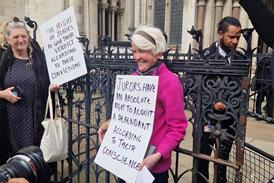What is ‘integrity’?
‘When I use a word,’ Humpty Dumpty said, in rather a scornful tone, ‘it means just what I choose it to mean – neither more nor less.’


If you were to ask the woman in the street what ‘integrity’ means, I suspect that, as often as not, you would receive the response that it is much the same as ‘honesty’. If you were then to press on, and ask the woman to describe the difference between dishonesty and lack of integrity, you might receive a blank look – because I do not believe that non-lawyers draw any real distinction between those two concepts. If non-lawyers are apt to treat them as much the same, why should lawyers treat them differently?
Well they do indeed treat them differently in professional disciplinary law. If, as a solicitor, you are found by the Solicitors Disciplinary Tribunal to have acted dishonestly, you will be struck off the roll, save in exceptional circumstances, which nowadays are extremely circumscribed following the Divisional Court judgment in SRA v James and others [2018] EWHC 3058 (Admin). On the other hand, if you are found to have acted with a lack of integrity you will probably not be struck off, although you may be. If you are found neither to have behaved dishonestly nor with a lack of integrity but to have breached the SRA Principles or Code of Conduct, again, you will probably not be struck off but you may be.
You may be forgiven if your head is starting to spin with these various layers of professional misconduct and you are wondering what all of this means and why it should matter. You are not alone.
It has long been required of solicitors by their professional rules that they behave with integrity, but until 2007 the meaning of the word did not need to be dissected by the SDT or the High Court on appeal, because ‘lack of integrity’ was never charged as an ingredient of ‘conduct unbefitting’, which used to be the standard disciplinary charge where there was no breach of a specific rule alleged (for example, most commonly the Solicitors Accounts Rules). Until the introduction of the Code of Conduct 2007, the Solicitors Regulation Authority and its predecessors had been content to charge ‘conduct unbefitting’, and to leave the SDT to determine the gravity of the misconduct, if proved. From 2007 onwards, however, it became common for disciplinary charges to make a specific allegation of lack of integrity as the SRA moved to charging breaches of rules in the Code of Conduct. The introduction of the 2011 code reinforced this change of practice.
Since then, the concept of lack of integrity has given rise to considerable judicial confusion and disagreement. The meaning of ‘integrity’ is somewhat elusive, and was initially explored in a series of cases arising out of the provision of financial services. The most frequently cited was Hoodless and Blackwell v FSA (3 October 2003), in which the Financial Services and Markets Tribunal described it as such: ‘In our view “integrity” connotes moral soundness, rectitude and steady adherence to an ethical code. A person lacks integrity if unable to appreciate the distinction between what is honest or dishonest by ordinary standards. (This presupposes, of course, circumstances where ordinary standards are clear. Where there are genuinely grey areas, a finding of lack of integrity would not be appropriate.)’
Attempts by the SRA to persuade the courts to expand upon the meaning of integrity were not initially successful. Like the proverbial elephant, it seems that integrity was easier to recognise than to define. In SRA v Chan and others [2015] EWHC 2659 (Admin), Davis LJ said a little grandly at [48] that ‘it serves no purpose to expatiate on its meaning’. Then in Malins v SRA [2017] EWHC 835 (Admin), Mostyn J stated that honesty and integrity were synonymous and interchangeable concepts. He disagreed with the judgment of Holman J in SRA v Wingate and Evans [2016] EWHC 3455 (Admin), in which the judge had held that there was a clear distinction between the two concepts. But Mostyn J’s view in turn was disapproved by a strong Divisional Court (Sir Brian Leveson P and Carr J) in Williams v SRA [2017] EWHC 1478 (Admin), which, for the first time aligned the meaning of ‘integrity’ with adherence to high professional standards. Sir Brian Leveson observed at [130] ‘… in the absence of compelling justification, I would reject Mostyn J’s description of the concept of want of integrity as second degree dishonesty. Honesty, i.e. a lack of dishonesty, is a base standard which society requires everyone to meet. Professional standards, however, rightly impose on those who aspire to them a higher obligation to demonstrate integrity in all of their work. There is a real difference between them.’
In February 2018, the matter came before the Court of Appeal in the SRA’s appeal against Mostyn J’s judgment in Malins and the solicitors’ appeal against Holman J’s judgment in Wingate and Evans. In his judgment [2018] EWCA Civ 366, Rupert Jackson LJ upheld the traditional analysis that the concepts of honesty and integrity are distinct, and sought to provide some guidance as to the meaning of lack of integrity:
‘[96] Integrity is a more nebulous concept than honesty. Hence it is less easy to define, as a number of judges have noted.
‘[97] In professional codes of conduct, the term “integrity” is a useful shorthand to express the higher standards which society expects from professional persons and which the professions expect from their own members. See the judgment of Sir Brian Leveson P in Williams at [130]. The underlying rationale is that the professions have a privileged and trusted role in society. In return they are required to live up to their own professional standards.
‘[100] Integrity connotes adherence to the ethical standards of one’s own profession. That involves more than mere honesty.
‘[102] Obviously, neither courts nor professional tribunals must set unrealistically high standards, as was observed during argument. The duty of integrity does not require professional people to be paragons of virtue. In every instance, professional integrity is linked to the manner in which that particular profession professes to serve the public.’
That is all very well, but breaches of professional rules can expose professionals to disciplinary proceedings without the need to add in this concept of lack of integrity. The important question that the Court of Appeal left unanswered in Wingate and Evans is what differentiates ‘ordinary’ professional misconduct from professional misconduct which involves a lack of integrity. Before the tribunal, all proved or admitted professional misconduct is serious, save in those rare cases in which the SDT imposes no sanction, and therefore involves a departure from the high professional standards expected of solicitors. What then is the additional ingredient which merits the description ‘lack of integrity’? Is it the seriousness or scale of the departure from the standards imposed by the relevant rules? Is it the mindset of the solicitor (intentional or reckless breaches of professional standards being more serious than inadvertent breaches)? Or is it both, or neither?
A new twist to this issue has been provided by Mostyn J in a recent judgment in Adetoye v SRA [2019] EWHC 707 (Admin). The judge returned to the theme developed in Malins, and identified a paradox created by the jurisprudence which followed it: ‘Doing the best I can to reconcile these conflicting messages from the higher courts I consider that I have to regard acting without integrity as involving greater moral turpitude than mere dishonesty but that, paradoxically, the former will generally attract a lesser sentence than the latter.
‘For my purposes the starting point where a want of integrity is proved against a solicitor is that he or she will, at the very least, be suspended unless the facts of the case can rightly be described as being very unusual and venial.’
The suggestion that suspension should be a starting point where a solicitor has been found to lack integrity will hopefully be rejected by the SDT. The tribunal is well aware that out in the real world, suspension and striking-off have become almost synonymous. Suspension from practice is not the same as suspension from driving – suspended solicitors cannot simply resume practice at the end of the period of suspension. They must apply for the restoration of their practising certificate, which may not be granted, or may be granted with conditions attached. Most suspended solicitors will no longer be a member of or employed by the firm at which they worked when the misconduct occurred, and may find it all but impossible to obtain a new position in a law firm (apart from anything else, the new potential employer will doubtless find an increase in its professional indemnity insurance premium to reflect the fact that it is proposing to employ a formerly suspended solicitor) – see generally Bryant v SRA [2012] EWHC 1475 (Admin). There have been numerous cases in which the SDT has declined to strike off or suspend a solicitor found guilty of lack of integrity, and the tribunal should be trusted to make these difficult decisions without constraints being imposed from above.
Speaking personally, we long for a return to the former practice of the SRA simply charging conduct unbefitting or professional misconduct, and letting the SDT sort out the gravity of the conduct when proved. The law works best when it is simple, easy to follow and easy to apply. Lack of integrity adds little or nothing of value to professional disciplinary proceedings and is apt simply to complicate and confuse. An ordinary English word has been given an extraordinary meaning in the context of professional practice in order to try to make some sense of it – with the paradoxical result identified by Mostyn J. Numerous solicitors found guilty of lack of integrity are (rightly in our view) permitted by the tribunal to continue in practice without interruption, yet it cannot promote confidence in the profession for the general public to see that such solicitors are permitted so to continue practice. It is time for the SRA to abandon allegations of lack of integrity, and simply trust the tribunal to assess gravity and appropriate sanction shorn of this very unhelpful concept.
Gregory Treverton-Jones QC of 39 Essex Chambers is co-author of successive editions of The Solicitor’s Handbook (2008-2019), co-author of Disciplinary and Regulatory Proceedings (9th edition, 2017) and an editor of Cordery on Legal Services. Nigel West is a partner at RadcliffesLeBrasseur



















![David Lester (senior partner at Blythe Liggins), Darryl Barnes, Jagdeep Sandher (head of dispute resolution at Blythe Liggins)[4]](https://d1d8vslyhr7rdg.cloudfront.net/Pictures/274x183/4/2/8/116428_davidlesterseniorpartneratblytheligginsdarrylbarnesjagdeepsandherheadofdisputeresolutionatblytheliggins4_981603_crop.jpg)







1 Reader's comment